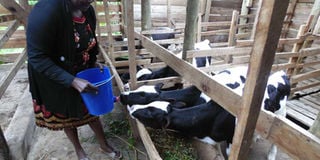Scouring in calves

A dairy farmer feeds calves in her farm in Meru. Ensuring that calves ingest enough colostrum 2-4 hours after birth as this provides them with immunity and ability to fight infections helps in curbing scouring. FILE PHOTO | NMG
What you need to know:
- The non infectious causes of scouring in calves are brought about by poor management and they include: dirty environment, inadequate nutrition, overcrowding and poor attention to new born calves.
- The calf continues to diarrhoea, becomes dehydrated (develops sunken eyes and a dry muzzle), losses electrolytes causing an imbalance in the normal PH that may lead to acidosis and death from cardiac arrest.
- A calf that develops scours should be isolated from the rest together with her dam and then treated to prevent spread of infectious agents.
- Minimise stress to new born calves from overcrowding, sudden change of feed and poor sanitation as they predispose the calf to coccidiosis infection.
Scouring is a management disease syndrome characterized by diarrhoea. It is one of the major causes of death in young calves aged between 2 to 30 days old.
The disease causes damage to the cells lining the intestinal wall impairing their ability to absorb fluids resulting to life threatening electrolyte imbalances.
A scouring calf will also suffer from losses of body fluids, dehydration, acidosis and loss of electrolytes. Sours in calves are caused by infectious and non infectious causes.
Some of the infectious causes include bacterial infections (Salmonelosis, E.coli, Clostridium), viral infections (Rota and corona viruses), fungal infections, protozoan infections (Cryptosporidia and Coccidia) and worm infestations.
The non infectious causes are brought about by poor management and they include: dirty environment, inadequate nutrition, overcrowding and poor attention to new born calves.
How scours affects the calf
Calves with scours are unable to absorb water and nutrients from their mother’s milk due to the damaged intestinal lining.
The milk in the intestine provides a rich environment for multiplication of pathogens worsening the condition.
The calf continues to diarrhea, becomes dehydrated (develops sunken eyes and a dry muzzle), losses electrolytes causing an imbalance in the normal PH that may lead to acidosis and death from cardiac arrest.
Treatment of scouring
Calves that develop scours require plenty of fluids and treatment should be aimed at correcting dehydration, acidosis and electrolyte loss.
Calves with early stages of scours should be provided with Electromix, a well balanced combination of dextrose and electrolytes that provides energy and enhances absorption of sodium in the intestines, promoting rehydration.
This is given to the calf orally, twice a day for 4 days, by mixing the powder in their drinking water. In cases where the calf is highly dehydrated and too weak to stand and walk, intravenous administration of fluids by a qualified veterinarian is recommended.
Most dehydrated calves suffer from hypothermia (inability to keep warm on their own) so it is important that they are provided with an external source of heat to keep them warm. An antibiotic treatment may be administered by a veterinarian to calves with scours.
PREVENTION OF SCOURING
How then can we prevent scouring in calves? It is important to note that scours prevention is better than treatment. Prevention can be achieved through:
Ensuring that calves ingest enough colostrum 2-4 hours after birth as this provides immunity and ability to fight infections. Proper attention to new born calves from farmers at this period is critical.
Provide the calf with a hygienic environment. Washing and disinfecting the calf pens, equipment and feeding troughs goes a long way in preventing diseases. Ensure that the calving area is also clean and dry.
The cows may be vaccinated against Infectious Bovine Rhinotracheitis, Bovine viral diarrhoea, rotavirus, corona virus and E.coli hence passing immunity to the new born calf through colostrum.
A calf that develops scours should be isolated from the rest together with her dam and then treated to prevent spread of infectious agents.
It is important that farmhands handling calves with scours wash they hands before and after handling the calves to avoid being sick.
Deworm older calves that are grazing with Albenol bolus once every three months to prevent scours caused by worms.
It is important to provide a cow with adequate nutrition during the last trimester of pregnancy as lack of proper nutrients (energy and proteins) is one of the causes of poor quality and quantity of colostrum provided for the calf leading to scouring.
Minimise stress to new born calves from overcrowding, sudden change of feed and poor sanitation as they predispose the calf to coccidiosis infection.
Maintain a nursing pattern for your calf; delays in feeding may cause the calf to over feed as they become really hungry and the cow has more milk than normal.
Such calves develop nutritional scours that are seen as white diarrhoea. This is caused by excess undigested milk passing through the intestines.
Calves with nutritional scours rarely become sick and hence don’t require treatment but in cases where the calf becomes dull and depressed call a veterinarian.
Dr John Muchibi is a Veterinary Surgeon and the Animal Health Manager at Elgon Kenya Ltd. Reach him through +254733715102 or e-mail him through [email protected]





